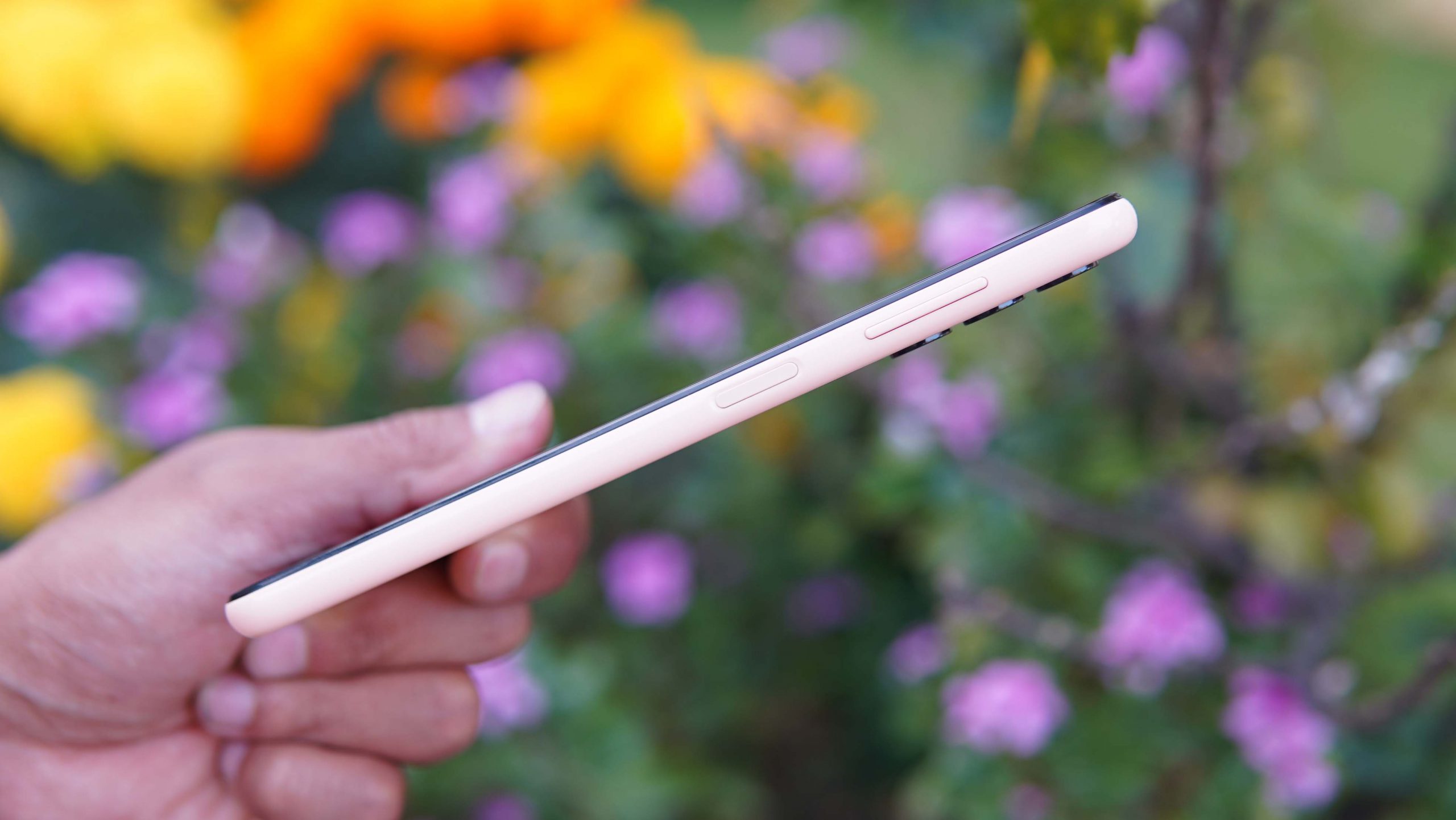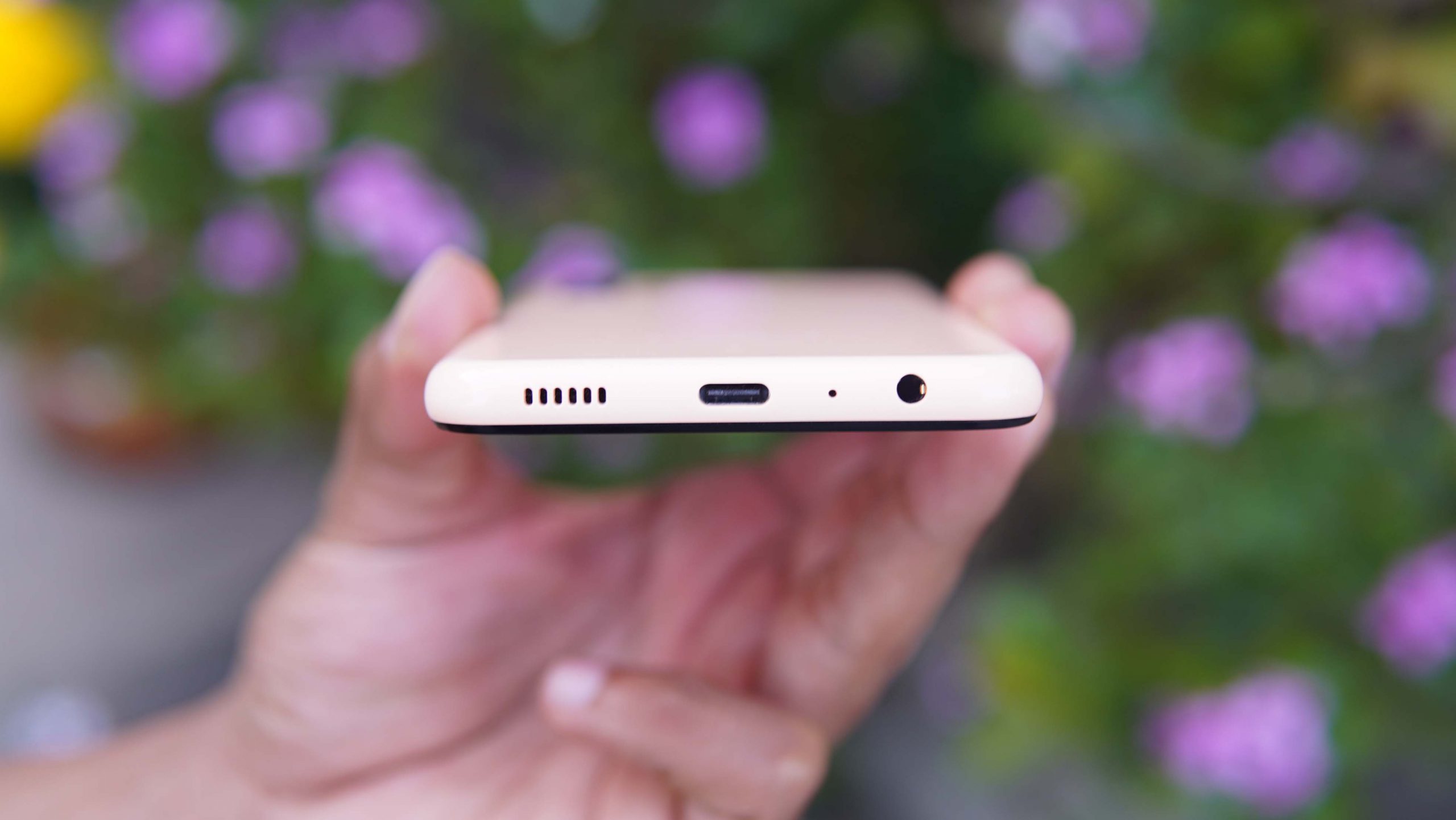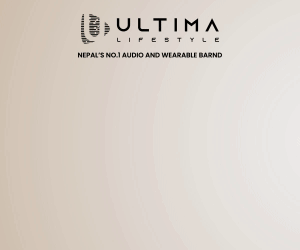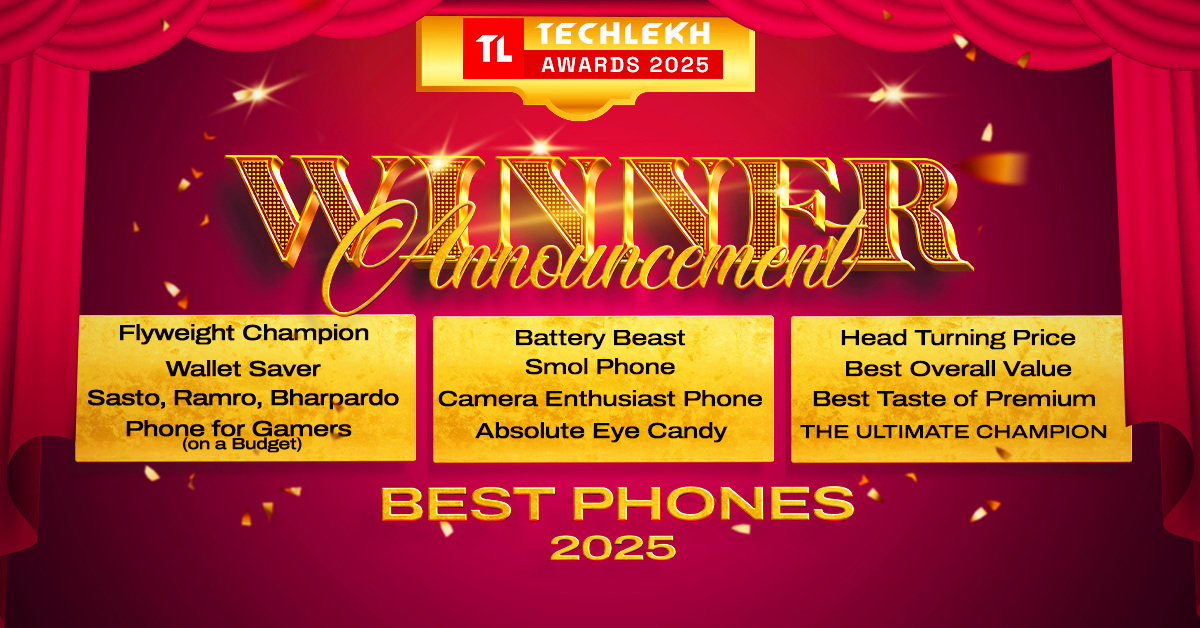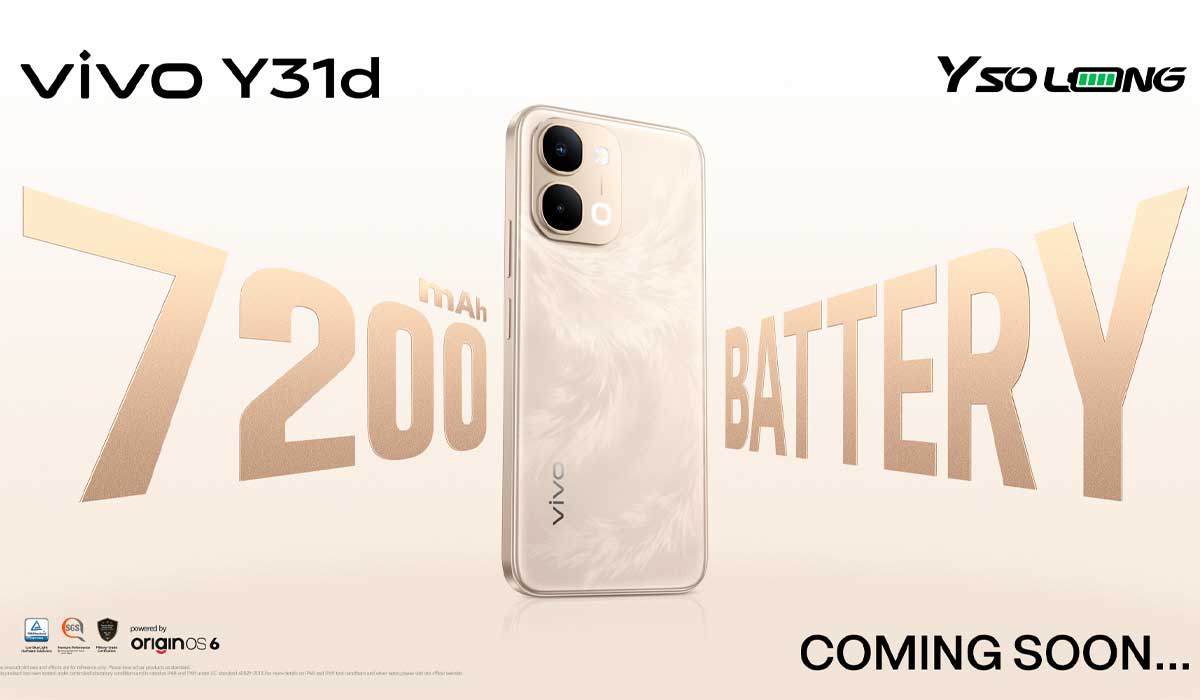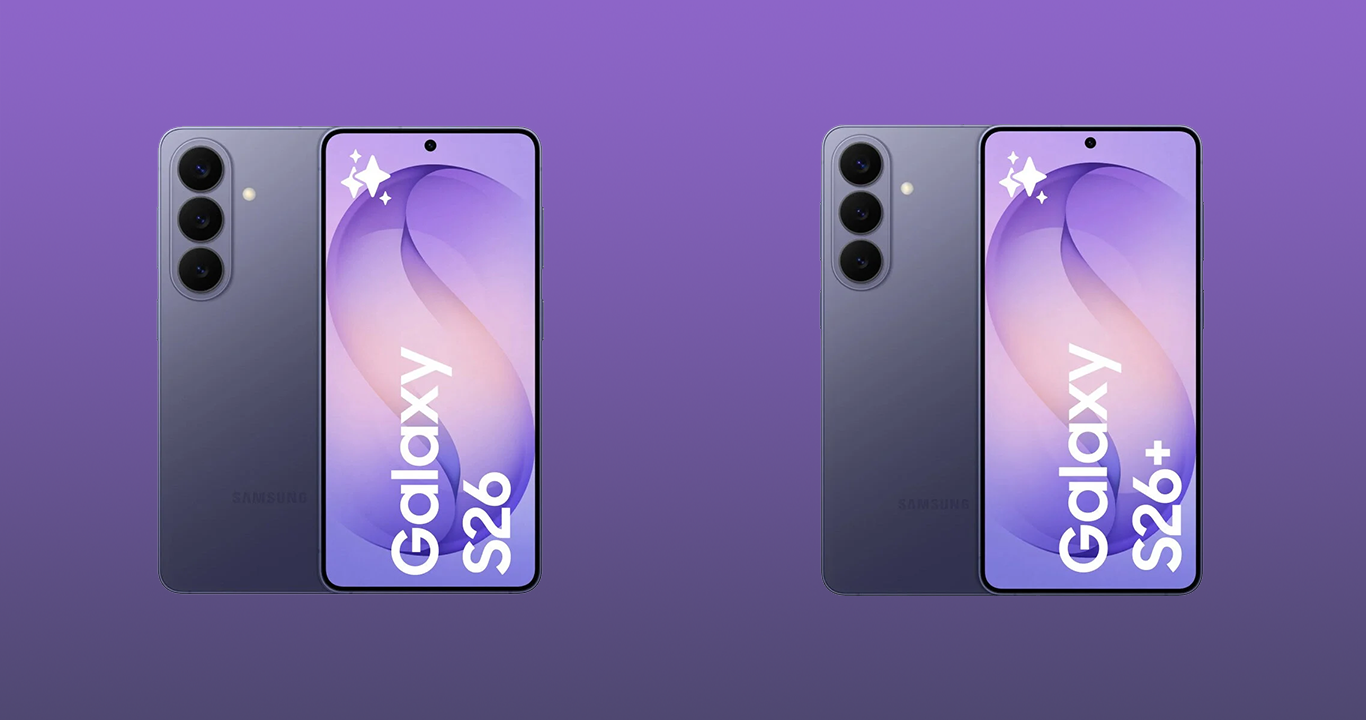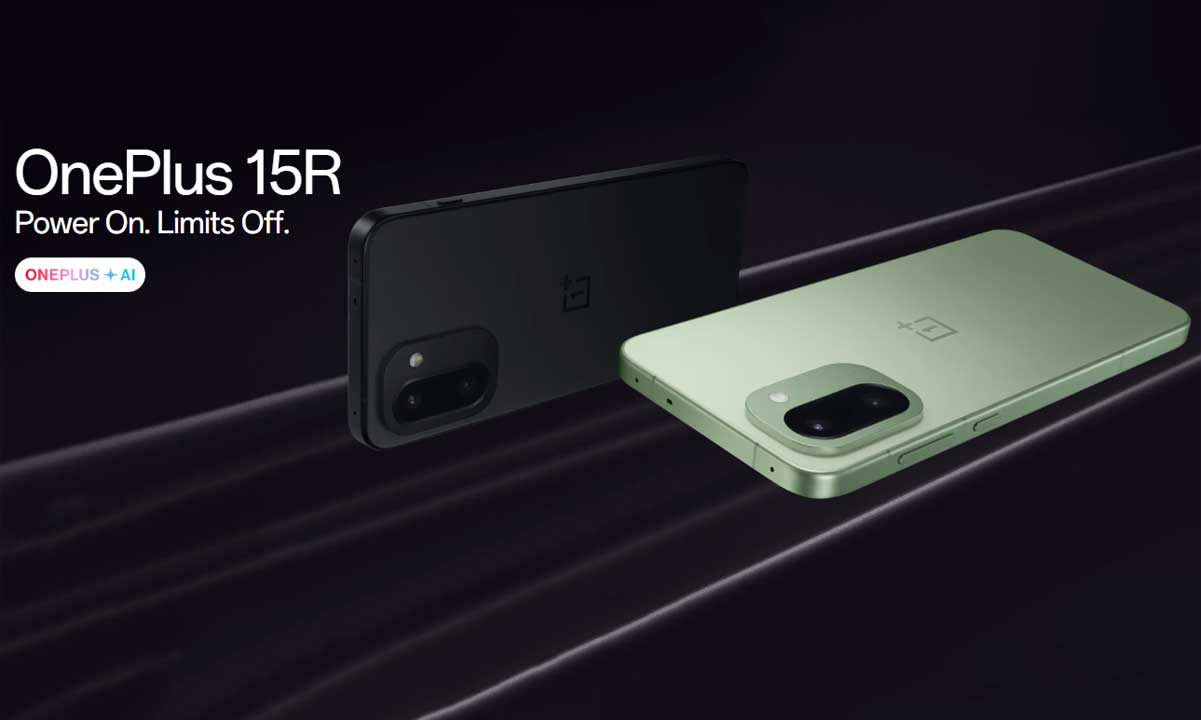Pros
- Solid camera performance
- Excellent battery life
Cons
- Unsatisfactory performance
- No high refresh rate display
- Does not come with the charger
- Unreliable auto-brightness adjustment and virtual proximity sensor
On August 30, 2022, Samsung launched a new 4G budget phone from its A series of smartphones, dubbed the Samsung Galaxy A13, in Nepal. There is also the 5G variant of the A13 but is not yet available in the country.
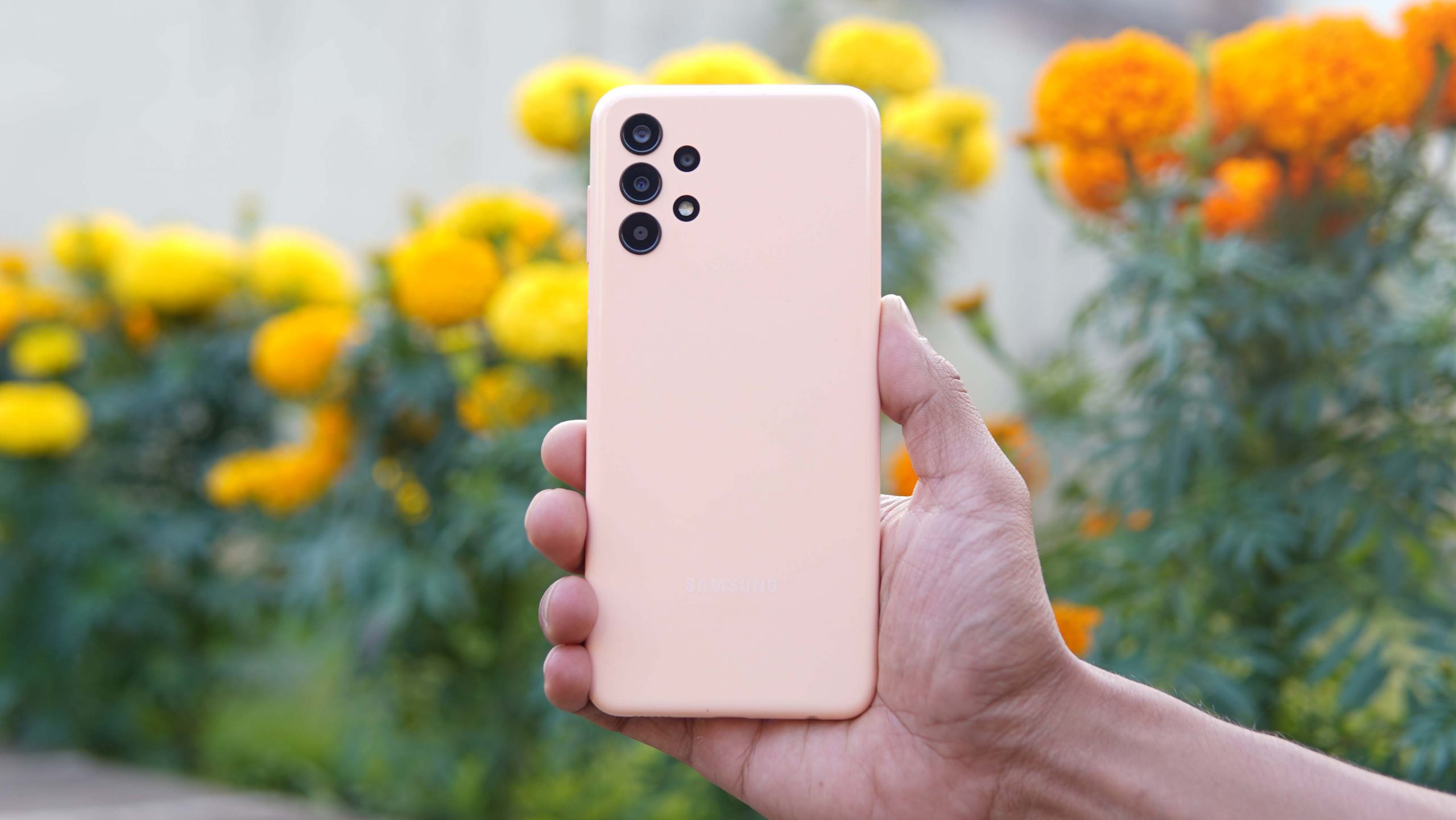
The Galaxy A13 is a successor of last year’s Galaxy A12, which started at Rs. 18,999, but the price of the A13 is significantly more expensive than the A12.
Launched at a price of Rs. 21,499 for the 4GB RAM variant with 64GB storage and Rs. 25,499 for the 6GB RAM variant with 128GB storage, the Galaxy A13 is powered by an Exynos 850 SoC, has an FHD+ LCD display, a 50MP main camera, and a 5000mAh battery.
Given the price tag, the specifications of the phone alone are not that impressive. But how does this phone perform under regular use? Find out in my Samsung Galaxy A13 review.
Samsung Galaxy A13 Specifications
- Body: 165.1 x 76.4 x 8.8 mm, 195 g, Dual SIM (Nano-SIM, dual stand-by)
- Display: 6.6 inches PLS LCD, 1080 x 2408 pixels, 20:9 ratio
- Chipset: Exynos 850 (8nm)
- CPU: Octa-core (8×2.0 GHz Cortex-A55)
- GPU: Mali-G52
- Memory: 64GB 4GB RAM, 128GB 4GB RAM
- OS: Android 12, One UI Core 4.1
- Rear Camera: 50MP, f/1.8, (wide), PDAF
- 5MP, f/2.2, 123˚ (ultrawide), 1/5″, 1.12µm
- 2MP, f/2.4, (macro)
- 2MP, f/2.4, (depth)
- Video: 1080p@30
- Front Camera: 8MP
- Video: 1080p@30fps
- Battery: Non-removable Li-Po 5000mAh battery, Fast charging 15W
- USB: USB Type-C 2.0, USB On-The-Go
- Misc: Fingerprint (side-mounted), accelerometer, proximity, 3.5mm headphone jack
- Colors: Black, White, Peach, Blue
Samsung Galaxy A13 Price in Nepal: Rs. 21,499 (4/64GB) | Rs. 25,499 (6/128GB)
Samsung Galaxy A13 Review
Design
- 165.1 x 76.4 x 8.8 mm
- 195 g
- Dual SIM (Nano-SIM, dual stand-by)
- Plastic frame and back
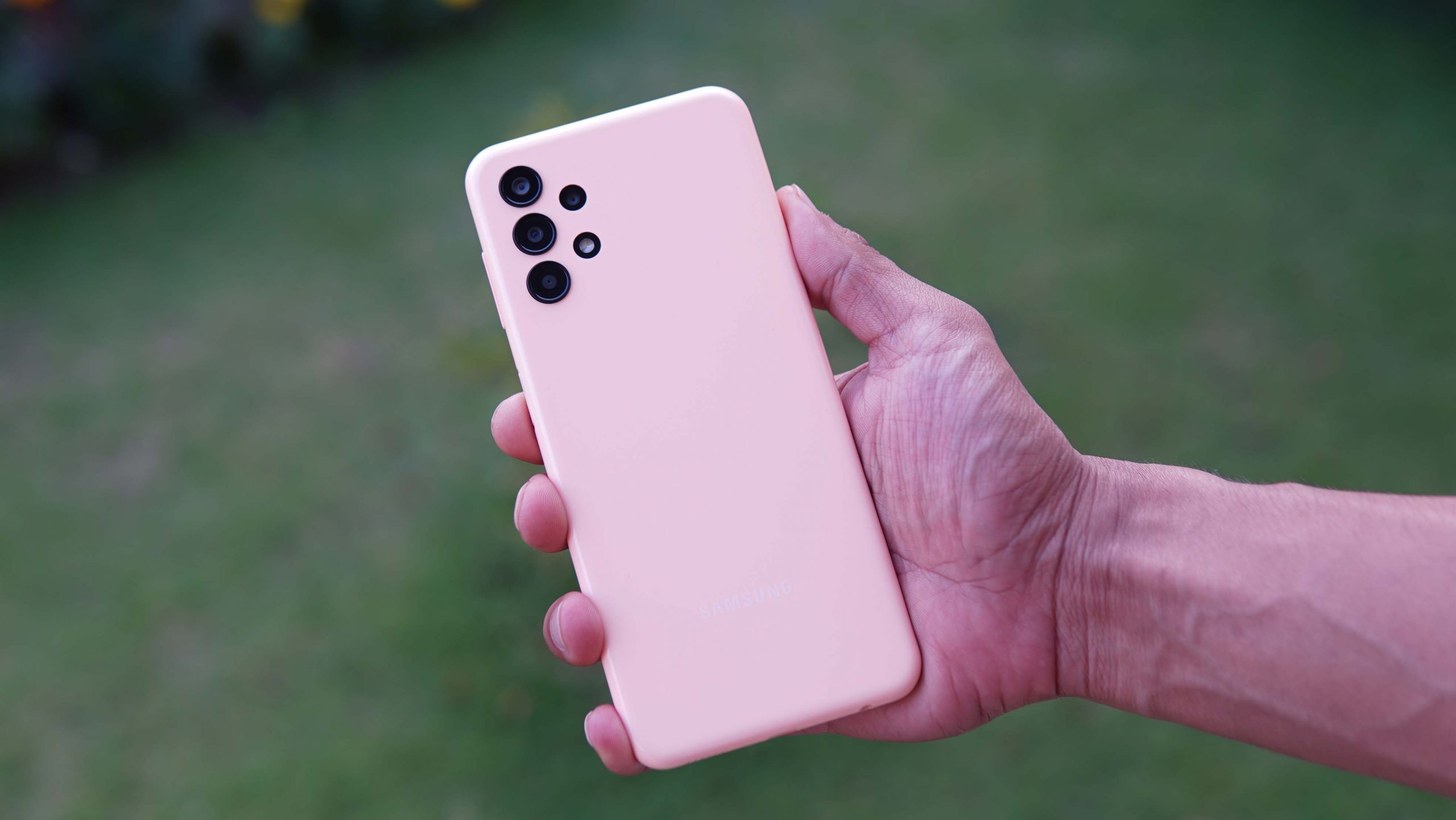
This year’s A series of phones from Samsung all look very similar, and the Galaxy A13 is not an exception. The A13 also looks the same as other Galaxy A series phones; the only visual difference is that the rear cameras are not elevated like those on other A series phones.
This year’s Galaxy A series phones, including Galaxy A23 and Galaxy A53 5G, all have a camera island on the back. The A13, on the other hand, has an almost flat camera layout. This design is identical to the Galaxy A32.
I am using this device in peach color, which, by the way, looks exactly like the Galaxy A23 that I reviewed a while ago. You can also buy this in black, white, and blue colors.
Similar to other A series phones, the plastic back panel of the device smoothly extends to the frame, and the power and volume buttons on the right are also color-matched.
Holding the phone is comfortable enough. Buttons are also reachable. And the fingerprint sensor on the power button is also reliable.
For the rest of the things, the phone has a tray on the left side that can hold two SIM cards and a microSD card. USB-C port, speaker, 3.5mm headphone, and mic are located on the bottom side of the device.
ALSO READ: Honor X6 Review: Affordable But Still Overpriced!
Display
- 6.6-inch PLS LCD
- FHD+ Display (1080 x 2408)

The smartphone features a 6.6-inch PLS LCD display. This is a Full HD+ panel, but unfortunately, it is fixed at a 60Hz refresh rate — so no high refresh rate support.
In terms of display quality, it is average.
The display is not that bright, so using it in a bright environment may be a bit uncomfortable, but it should be enough for normal use.
Also, I found the auto-brightness to not work properly all the time. Most of the time, when I would go from an indoor to an outdoor environment, the display would not automatically increase its brightness. I would have to manually raise the brightness or toggle the auto-brightness switch off and on.
For the colors, they are average for a budget phone with an LCD display. It’s fine for casual movie sessions.
Performance
- Exynos 850 (8nm)
- Octa-core (8×2.0 GHz Cortex-A55)
- Mali-G52
- 4/6GB RAM 64/128GB storage, supports microSD card
The phone is available in two memory configurations in Nepal: 4GB RAM with 64GB storage and 6GB RAM with 128GB storage. I don’t know why but Samsung sent me the 3/32GB variant of the Galaxy A13 for review.
Even a light user will struggle with 32GB of storage. It’s simply not enough in 2022. The good thing is that Samsung does not sell the 32GB variant in Nepal — at least not as of now.
Anyway, all the processing is handled by Samsung’s entry-level Exynos 850 system-on-a-chip (SoC). Built on the 8nm LPP process, the 850 has eight cores, all ARM Cortex-A55, with a maximum clock speed of 2.0GHz.
At this price, this chipset is a disappointment. That’s why the performance of the device is also bad. The phone feels very laggy.
If you want to multitask on this phone, it will test your patience level for good.
The whole UI itself feels very slow, especially Samsung’s camera app. You really need to have good patience if you want to take a picture with this phone. Even after you manage to click a photo, you again need to wait for a few seconds to click another photo, view it, or change the camera lens. I found this to be frustrating.
BENCHMARK
Let’s now talk about some benchmark test scores, as they will give some idea of how this phone compares with other phones in terms of performance.
Testing on Geekbench 5, which tests the CPU performance of the device, the single-core score managed to get just over 150, while the multi-core scored under 600. These scores are very low for a phone in this price range.
If we compare the CPU performance of the Galaxy A13 with that of the similarly priced Redmi 10 and Redmi Note 11, both powered by the Snapdragon 680, the scores of the A13 are lower than half, which is embarrassing.
And the thing is, the Snapdragon 680 is not even a very powerful chipset. If we compare with a Helio G96 chipset, which can be found in the similarly priced Narzo 50, we can see that the Narzo 50 beats the Galaxy A13 by scoring over three times more.

The graphics performance of the device is not as embarrassing as its CPU performance, although it is not impressive either.
For the record, the raw graphics performance is on par with, if not marginally better than, the Snapdragon 680. However, given that the GPU on the 680 isn’t that powerful to begin with, there’s nothing to be very proud of.
Note that I said the “raw” graphics performance of the Exynos 850 is on par with the Snapdragon 680. In practice, the GPU performance feels worse. This point will make more sense when you read the gaming test below.
When testing the GPU performance on the 3DMark Wild Life test, the Samsung Galaxy A13 managed to score over 480, which is comparable to the Snapdragon 680 but still less than half the score of the Narzo 50.

GAMING
When I earlier said that the graphics performance of the Samsung A13 is on par with the Redmi 10, I meant the raw performance, meaning it managed to get comparable GPU benchmark scores. But I assume that the Exynos 850 is not well optimized because, in practice, the GPU performance is far worse than the Snapdragon 680.
When playing PUBG Mobile, setting the Graphics to “Smooth” lets us set the Frame Rate to “Ultra.” But in these settings, the FPS was not stable at all. The FPS was constantly fluctuating between 20 and 40 with tons of stutters. The average FPS was 30, but it was very unstable.
Leaving the Graphics at “Smooth,” when I lowered the Frame Rate to “High,” I was getting around 25FPS of average FPS with many serious stutters.
ALSO READ: Samsung Galaxy A04s Review: Good Camera Poor Performance
Camera
- Rear Camera: 50 MP, f/1.8 (main)
- 5MP, f/2.2, 123˚ (ultrawide)
- 2MP, f/2.4, (macro)
- 2MP, f/2.4, (depth)
- Video: 1080p@30fps
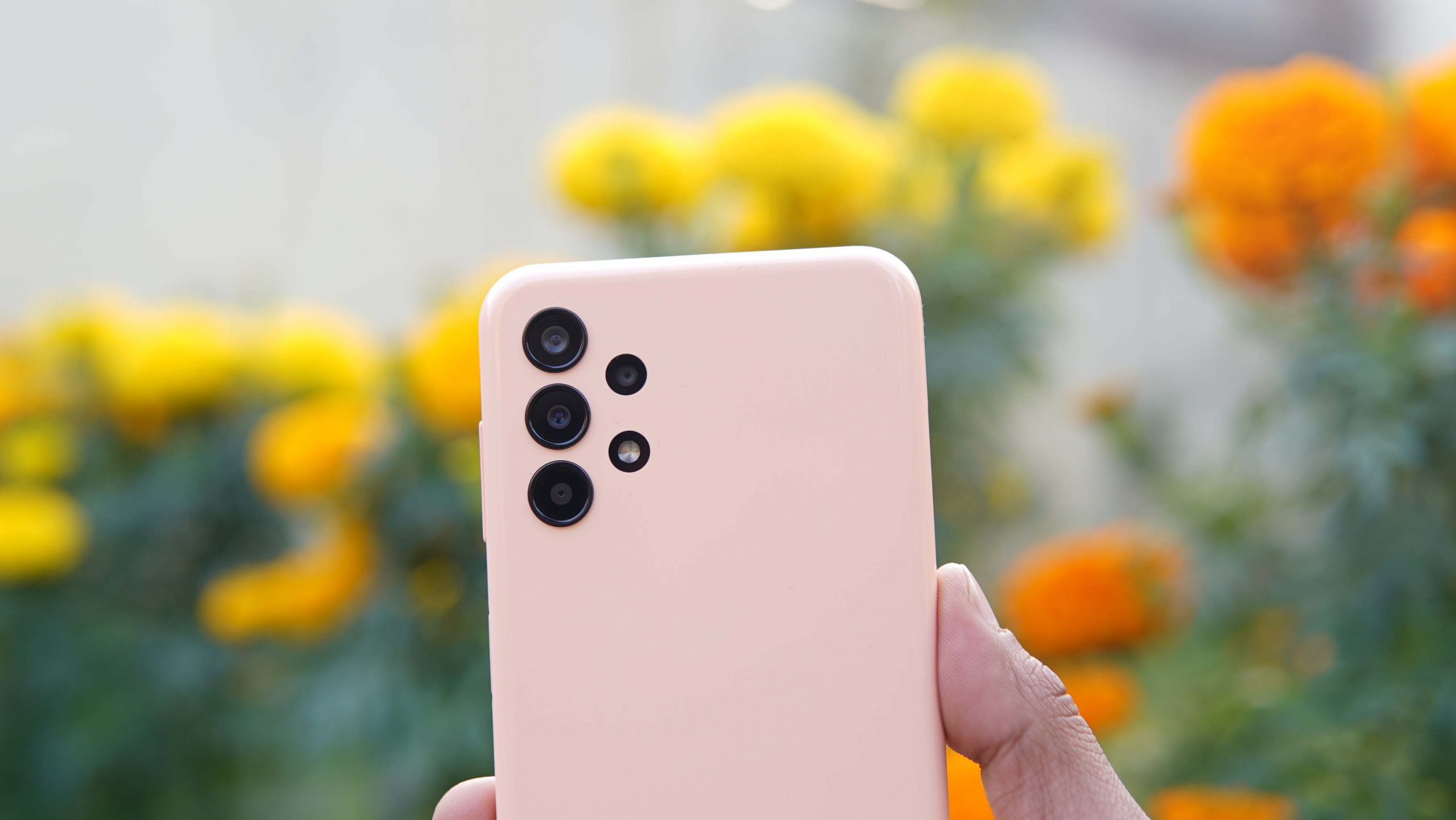
The Samsung Galaxy A13 features quad-camera setup at the back comprising a 50MP main camera, 5MP ultrawide camera, 2MP macro camera, and 2MP depth sensor.
The cameras are actually not that bad. I am quite impressed by the camera performance of the device considering the price, although the camera app feels sluggish.
NORMAL PHOTOS
For a budget phone, I found the photos from the main camera to be good. The colors are pleasing, and the details are also good.
The photos taken by the Galaxy A13 have the vibrant colors that we are used to seeing on Samsung phones.
The photos may appear a little bit more saturated than they actually are, but the overall quality is good. The dynamic range is also fine.
ULTRAWIDE PHOTOS
Normally, the photos from the ultrawide camera of a budget phone are poor. But surprisingly, this phone does not fall under that group of budget phones.
Although the ultrawide camera’s details and sharpness are inferior to those of the main camera and it, in comparison, improperly exposes the shadows, the colors are good, albeit slightly boosted.
The dynamic range is also satisfactory. Noise in photos is visible when the lighting is inadequate, but it is not a big deal.
MACRO CAMERA
Predictably, photos from the macro camera are unsatisfactory. It’s better to use the main camera than the macro camera of the Galaxy A13.
PORTRAIT CAMERA
When taking portraits in portrait mode, the phone is able to properly detect the subject and blur the background.
I found that the Galaxy A13 does not perform any facial retouching when in portrait mode, in contrast to the majority of other phones. Whether or not this is good depends on your preferences.
While some people like a natural appearance, others favor face retouching.
FRONT CAMERA
The selfies from the front camera are nice. In good lighting conditions, selfies come out great. The camera properly exposes the face, and the skin tone also looks pleasing.
Some noise can be seen in the photos, but the details are nicely captured. In low-light conditions, noise tends to rise while details tend to decrease.
VIDEO
The phone is capable of shooting up to 1080p video at 30fps. The video quality is also amazing, considering the price. The colors and details are great. However, the stabilization is just average.
Battery and Others
- 5000mAh battery
- USB Type-C
- Android 12
- One UI Core 4.1
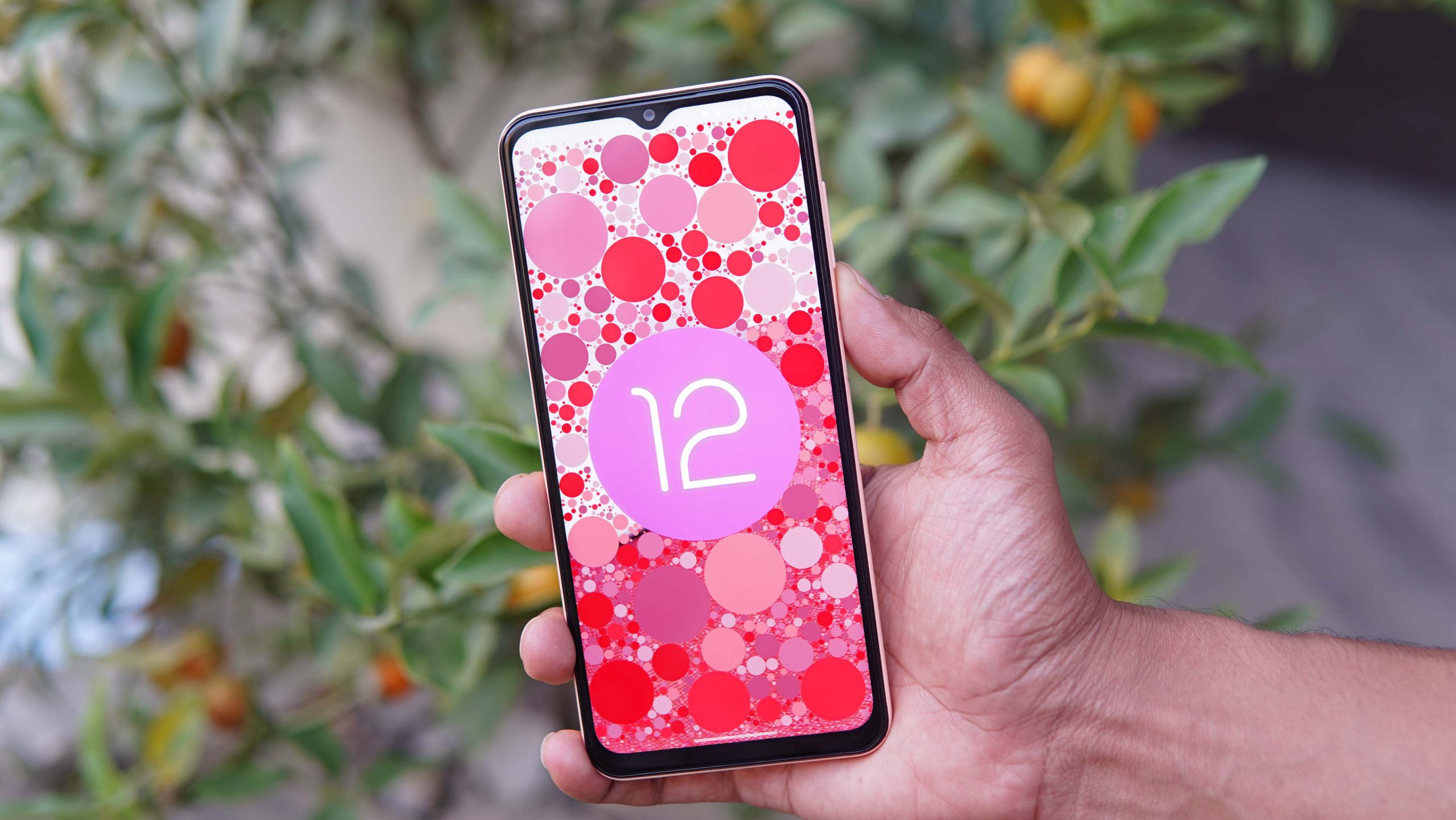
The battery life on the Samsung Galaxy A13 is excellent. During moderate usage, the battery delivered more than 8 hours of screen-on time, which is great.
Charging speed, on the other hand, is not that impressive compared to other phones in this price range. It supports 15W fast charging. It took me over 2 hours to fully charge the device from 0 percent. By the way, you need to buy the charger separately as it does not come with one.
The soul of the smartphone is run by One UI Core 4.1 on top of Android 12. The software experience is nice; there are no significant problems that I could find aside from the laggy experience.
One other annoying issue is the unreliable virtual proximity sensor. The virtual proximity sensor does not always work accurately, resulting in not always turning off the display during calls.
Lastly, the phone has a single bottom-firing speaker. Speaker quality is average. It’s loud. I did not find any sound distortion even at full volume, which is good.
Should You Buy Samsung Galaxy A13?
The Samsung Galaxy A13 is a budget phone from Samsung. For a budget phone, I found both the front and back camera performances impressive. They capture beautiful photos.
The design of the smartphone is also decent, and the battery life is superb. Yet, I find it difficult to recommend this phone. The main reason for that is its disappointing performance.
If you look at other competitors, all of them are performance-centric devices with better chipsets and better performance. But this phone struggles to even keep up with the basic tasks. Almost all budget phones have a poor experience with Samsung’s One UI.
On top of that, the display of the Galaxy A13 is only average with no high refresh rate support, and the charging speed is also not that fast. For these reasons, if I had to suggest phones, I wouldn’t pick this phone as my top choice.
Honestly, Samsung used to make better budget phones.
Old Samsung phones such as Samsung Galaxy F22 and Samsung Galaxy M21 still offer better value. The Galaxy F22 is still available on the market, so if you can get your hands on one, it’s better to go with that phone than the Galaxy A13.
Other alternatives are Xiaomi Redmi Note 11, Xiaomi Redmi 10 Prime 2022, Realme Narzo 50, and the recently launched Poco M5. The camera performance of these phones may not be as good as that of the Samsung Galaxy A13, but because of its poor performance, it’s at the bottom of the list.
ALSO READ: Samsung Mobiles Price in Nepal: Features and Specs
So this is my Samsung Galaxy A13 review. What do you think of the Samsung A13? Let me know in the comments!
Also, watch our review video of the Samsung Galaxy A13 in Nepali.
-
TechLekh Awards: Best Phones of 2025 in Nepal Winners!Ooooooooooh boy, what a year it was for smartphones, even in Nepal! Phones have been…
-
TechLekh Awards: Best Tablets of 2025 in Nepal Winners!The smartphone scene in Nepal was absolutely crackling this year with constant new launches and…
-
TechLekh Awards: Best Scooters of 2025 in Nepal Winners!Scooters have played a major role in shaping everyday mobility in Nepal. They have always…
-
TechLekh Awards: Best Bikes of 2025 in Nepal Winners!Motorcycling in Nepal has always meant more than just getting from one place to another.…
-
TechLekh Awards: Best Cars of 2025 in Nepal Winners!Electric vehicles continue to dominate Nepal’s market in 2025, and Chinese manufacturers still lead the…
-
vivo Y31d with Massive 7,200mAh Battery Launching Soon in NepalHIGHLIGHTS The vivo Y31d price in Nepal could start from Rs. 23,999 (6/128GB). The device…
-
Samsung Galaxy S26 and S26+: Playing It Safe in 2026?HIGHLIGHTS The Samsung Galaxy S26 and 26+ are launching on February 25, 2026. The phones…
-
OnePlus 15R Launched in Nepal at a Flagship Price! Is It Even a Flagship Killer Anymore?HIGHLIGHTS The OnePlus 15R in Nepal starts at Rs. 98,499 (12/256GB). The phone is powered…









